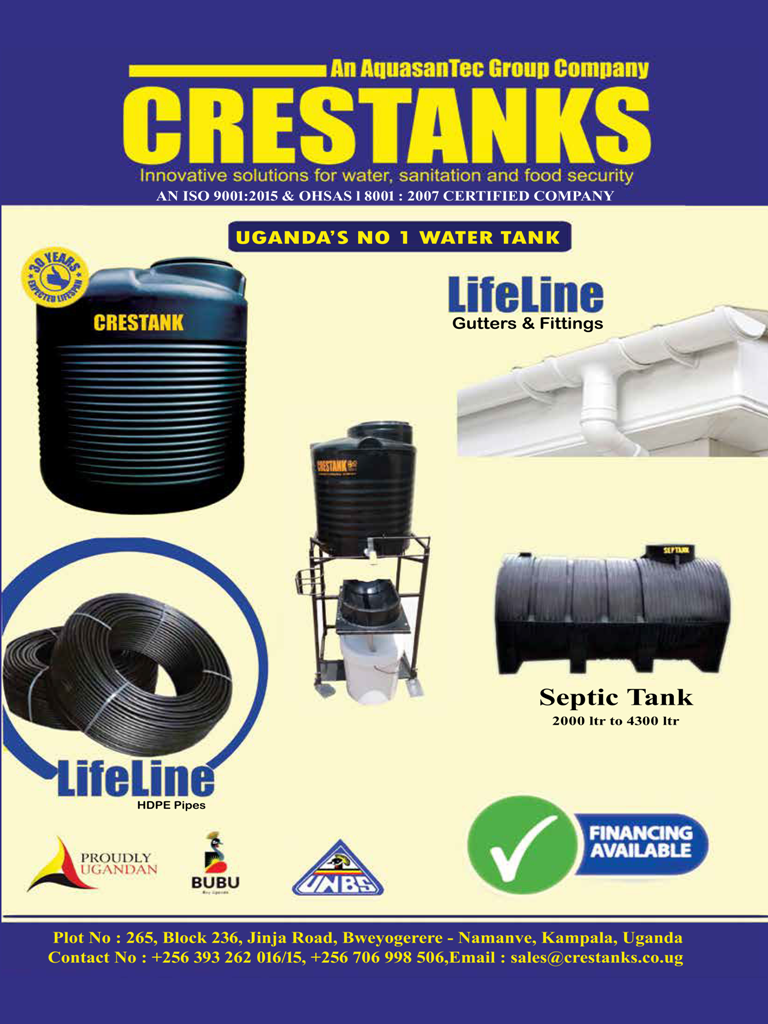SOROTI/SERERE: As safe and clean water becomes ever essential in the fight against the COVID-19 pandemic, the Pentecostal Assemblies of God (PAG) evangelical denomination is helping communities in the Teso sub-region to overcome its water access challenges.
In spite of their support to ease access to this God-given resource, water remains elusive in most communities, with tales of people trekking for distances in search for it.
For decades, the brunt of that water shortage has been felt by mothers & children, who are almost always assigned to search for water. It’s therefore against this background that PAG, through its partners, has intervened to lessen the burden of access to water by constructing water sources close to people.
In this era of COVID-19, PAG’S hand of faith is enabling communities to have access to safe and clean water. As a result, locals have managed to adhere to the call by the government to wash hands as one of the preventive measures to curb spread of Coronavirus in communities.
Mr Patrick Onaga, the acting manager for social development services in PAG’s Central Teso Pastorate, says that through their Participatory Evaluation Processes (PEP), they are moving away from only preaching the word of God to engaging communities in social economic development. He said the move is empowering locals through various community-driven projects, including through providing access to safe water sources.
“Previously, we had dedicated ourselves much into preaching the word of God and preparing people for the second coming of Jesus Christ. But along the way, it became prudent that we needed to engage our followers in activities that shape their livelihood,” Mr Onaga told The Wash magazine during a visit to various water point sites.
For nearly a decade in the 1980s and early 1990s, Teso suffered a lag in development due to the a series of wars and community conflicts such as the 1980s Karimojong cattle raids, the Uganda People’s Army (UPA) rebellion, and the 2003 Lord’s Resistance Army (LRA) incursion into Teso. Those conflicts affected the water coverage development in the region, a situation Teso is yet to fully recover from.
It is that hold-up which PAG is trying to bridge using funds from Teso Development Trust and the Japan Embassy.
In Amoru village, Awalwal parish, a 30-minute drive Northeast of Soroti town, is one of the water investments that PAG and its partners helped to sink. The borehole is the main source of clean water for more than 400 people.
On our maiden visit to the area, the large number of people at the water source signified how relevant the water point is to the locals. Sights of young children, the elderly and men welcomed us to Amoru village borehole.
For Mr Onaga, the sight of the buzz in activity at borehole is a confirmation that they made a worthy choice through their PEP model to sink boreholes for locals.
“With the funds from our funders, we engage communities through our shared values and sink shallow boreholes, and this has proved a great success because communities that previously had to trek for kilometres away from their homes in search for water have that burden lessened,” he explains.
The acting manager says that so far PAG, has injected more than Shs600 million into the water projects, with 16 more water sources earmarked to be drilled this year in Serere, Soroti and Kaberamaido respectively.
In Serere, Mr Onaga says, the shallow boreholes that go for Shs6 million each have been welcomed by communities around the lake areas as having tasty and non-salty water when compared to boreholes that are sunk deep.
The Central Teso Pastorate project overseer adds that in some cases, their water targets in some years are dealt a blow by the readiness of contractors awarded the tenders but that is being looked into.
On average, going by the assertion of the area LC1 chairperson, Mr Moses Ereu, the Amoru community borehole serves families with an average of 8-13 members.
And during the times when swamps in the area run dry due to drought, the borehole also serves as a watering point for herds of animals.

Consequences of water shortage
LC1 chairperson Ereu said PAG intervention in seeking for solutions into their water crisis was timely. He adds that prior to this, locals regularly trekked for up to three kilometres to the neighbouring villages of Telamot in search for water.
“Things have changed for the better, water has been brought to our proximity,” he noted.
According to Ereu, the water troubles then amplified cases of domestic violence in various homes, as most husbands often beat up their wives on suspicion of over delaying at wells as they searched for water for domestic use.
He confirms to The Wash Magazine that the reliability of the water source is so perfect that it has often withstood long dry spells, making it one of the best water sources in a sub county that is more known for having a poor table that has made some boreholes run dry during extreme weather condition when there are no rains.
Ms Christine Akiror, 80, one of the older mothers in here who had endured the suffering as result of water scarcity for most of her life praises PAG water interventions. She vividly recollects scenarios when they shared swamp water with animals, how they trekked for longer distances, adding that this is no longer the case.
Sharing the same joy like the rest of the members is Samuel Leonard Oluga, the chairperson of the water user committee in Amoru community borehole. He says before the borehole was sunk in their village in 2008, they used to walk for longer distances to Arubela parish where there was a borehole.”
“Because we don’t want to go back to the past, I head a committee that is jealously guarding this borehole from getting spoilt. Each family has to pay a certain amount of money towards the repair of the borehole,” he says.
As part of the water user committee’s mandate, Mr Oluga further explains, matters of hygiene are treated with a lot of care. “All water utensils have to be cleaned regularly to avoid scenarios of water contamination using dirty Jerrycans,” he says.
The water point user chairperson adds that before his village received their borehole, cases of waterborne diseases like Typhoid Dysentery and among others were much pronounced. But today, the rates have diminished, a positive change in circumstances that he attributes to the safe and clean water source.
The same joy is being felt in Okulunyo parish, Amuko village, where a similar water source drilled in 2018 through the PEP model has lessened the water burden crisis that once affected residents of the area. The locals are harnessing the benefits of the water source for home and animal use, as well as vegetable cultivation.
Mr Martin Edyagu, the chairperson of Amuko village water user committee, says the borehole serves 600 people, and on average 13 people per family.
“Before we lobbied for this borehole from PAG in 2018, the nearest water source we drew water from was 4 kilometres away from here, having this borehole now here is an advantage to all families that draw water from it,” he adds.
Mr Edyagu says one among the many benefits is that they can raise seedlings and vegetables using spill over water from the borehole.
Call for water for small scale irrigation
After finding satisfaction in the availability of water for domestic use, another emerging demand seems to be taking centre stage among the beneficiaries; that is the need for water for irrigation.
Ms Akiror, 80, who earlier shared the joy of having a water source nearby, now hopes that the PAG project will also help them overcome water shortages in their gardens.
“Our request to PAG is to factor in an element of water for irrigation in their water plan,” Ms Akiror said in her plea to the acting manager social development services for PAG’s central Teso pastorate.
Buttressing Ms Akiror’s assertion in a separate interview, Mr Joseph Edyagu, also aged 80, told Wash magazine that with changing weather vagaries at play, the need for water to feed vegetable gardens will be an added advantage.
“Rains at times fail us, so we need water to help us mint cash from vegetables,” Mzee Edyagu says.
Ms Catherine Adeke, another beneficiary, says as mothers, water for irrigation once provided for, will empower them economically, saying this can be possible when that component for water for irrigation is included in the PEP model by PAG.
She says from the vegetables, they can offset certain family demands, instead of waiting for everything to be done by their husbands.
Mr Patrick Onaga, the acting manager for Social development services, Central Teso Pastorate, says the appeal will be looked into. But he added that the decision will be based on the needs of the community, which they are currently studying through community interaction with PAG using the PEP model.


















